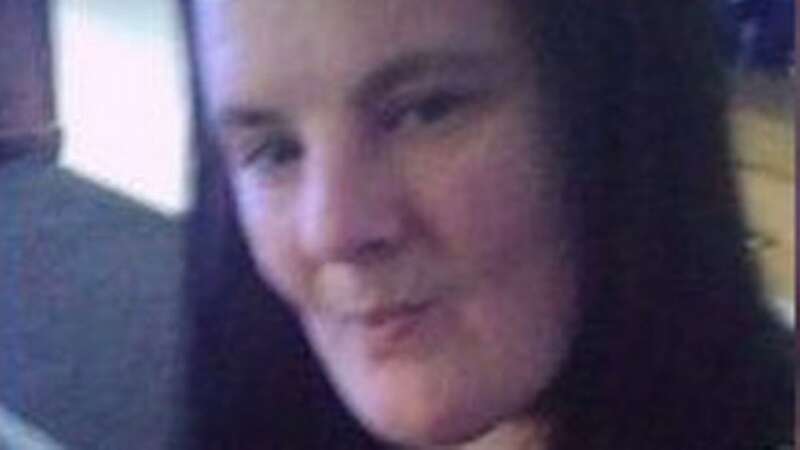
A doting mum who was 'loved by everyone but herself' has been found dead days after being reported missing, an inquest heard.
Colette Fazackerley, 40, was said to be in a good mood when she was last seen happy and hugging friends outside Bar 15 in Ashton-under-Lyne, Tameside, on April 7. Her partner, who she had been drinking with earlier that day, said she told him she wanted to stay out a bit longer. The following morning, he realised she wasn't at home and raised the alarm. after realising she wasn't at home.
Ms Fazackerley didn't have her mobile phone with her when she disappeared and her body was found two days later on land next to a railway line near Ashton Cricket Club. The mum-of-three was described as 'vivacious and caring' with a 'heart of gold' by her mum in a statement read at her inquest, the Manchester Evening News reported. Police on Monday told Stockport Coroner's Court how Ms Fazackerley's body was found entangled in fencing around 20 metres from the track. The location was around a 20 minute walk from the bar.
 The mum-of-three was described as 'vivacious and caring' with a 'heart of gold'
The mum-of-three was described as 'vivacious and caring' with a 'heart of gold' The inquest heard Ms Fazackerley had a 'complex mental health history' (Family submit)
The inquest heard Ms Fazackerley had a 'complex mental health history' (Family submit)A post-mortem examination gave a cause of death as 'multiple injuries' consistent with being hit by a high-speed train. The tragedy is not being treated as suspicious. The train involved has not been traced despite extensive enquiries and there were no reports from any drivers of collisions at the time, the coroner heard.
The inquest heard Ms Fazackerley had a 'complex mental health history' which involved self-harm and suicidal ideation. But a coroner said there was nothing to suggest any 'signs' were missed from mental health teams involved with her care that there was an imminent risk of Ms Fazackerley taking her own life.
 Daughter of Brit couple killed in helicopter crash says 'we are heartbroken'
Daughter of Brit couple killed in helicopter crash says 'we are heartbroken'
Assistant coroner Adrian Farrow ordered Pennine Care NHS Foundation Trust to report back to him on what steps were being taken to improve information sharing between mental health agencies. In a statement to the inquest her mum, Julie Fazackerley, said: "She had a good sense of humour and was a character, despite her issues. She kept our family together. Everybody loved Colette, but she herself did not feel loved."
Julie Fazackerley said that when her daughter, of Ashton, was 13 she witnessed a friend fall from a disused building. They survived, but the inquest heard it affected Colette in the following years. Her mum added: "Colette's death came as a great shock to us. She had a lot of qualities and a heart of gold. She always put others first and loved her children."
Her GP referenced hospital admissions and medication she was on, and said she was under the care of community mental health teams. She was also facing court proceedings which were said to have been 'bothering her'.
The inquest heard Ms Fazackerley engaged well with mental health services and had 'robust' support available to her. No fault in the care she received was found by the trust.
Her use of alcohol, however, 'took her to a very dark place where she was not really in control of what she did', the inquest heard, although she was said to have been 'working on everything, and working really hard on it'.
Her last text message to her partner had indicated she was happy, police told the inquest.
Assistant coroner Mr Farrow described Ms Fazackerley as 'vivacious with a good sense of humour and a caring nature'. He said she had PTSD and Emotionally Unstable Personality Disorder, but had 'good insight' into the diagnoses and recognised that at times of stress and when she drank alcohol, she could experience 'darkening of mood' and be impulsive. Ms Fazackerley also had epilepsy.
But mental health episodes, Mr Farrow said, 'passed quickly' and highlighted her instability, although her condition didn't 'manifest' itself in any particular pattern. As a result, Mr Farrow said it was 'impossible to predict' when her deteriorating mood would trigger an impulsive act. He said there was no evidence to suggest any signs were missed on the part of mental health teams that there was an imminent risk of Ms Fazackerley taking her own life.
"There was nothing giving any rise for concern on the day she went missing," Mr Farrow said. He said he was satisfied she sustained her injuries from a high-speed train, but said the evidence didn't show whether it was accidental or intentional.
The inquest heard toxicology tests showed she was around twice the legal drink-drive limit, although at the time of her death she was 'actively seeking assistance' for her alcohol use. Mr Farrow added that he could not rule out her falling because of alcohol and recorded a narrative conclusion. "She died from injuries from a collision with a train, the precise circumstances of which cannot be ascertained," he said.
 'I left my Xmas tree up until March - my husband wanted it gone but I refused'
'I left my Xmas tree up until March - my husband wanted it gone but I refused'
Read more similar news:
Comments:
comments powered by Disqus

































